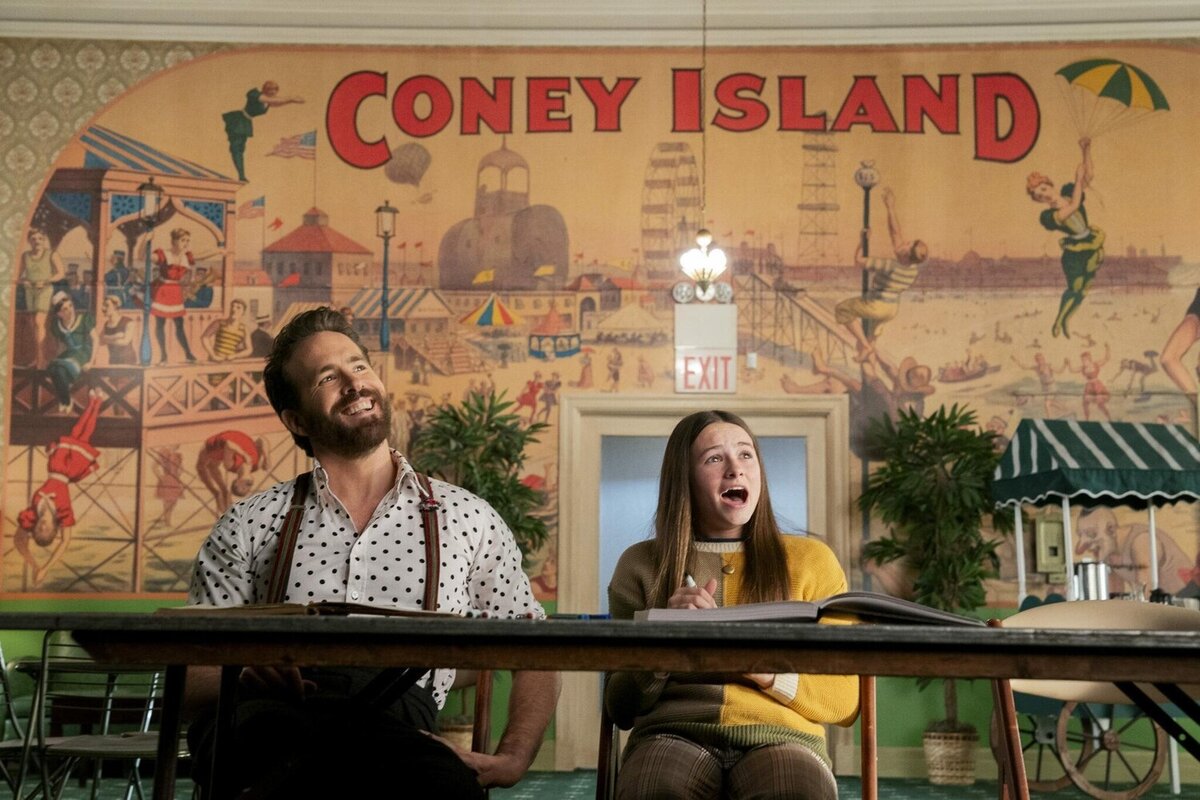«IF» - Movie Review by Kinoafisha

A Touching Ode to Childhood by John Krasinski.
The phenomenon of childhood, which regards a child not merely as a "little adult" as was the case in Victorian England, but as a person in an extremely delicate phase of development requiring meticulous care, only spread widely relatively recently — in the mid-20th century. Almost immediately, childhood became a subject of pop culture. To cartoons and comics, which had catered to children since the 1930s, cinema was added in the 1970s following the release of "Star Wars". Since then, the leitmotif of many Hollywood (and not only) family films has been the reminiscence of childhood — a blissful and wonderful time when imagination knows no bounds, yet is fleeting. Inevitably, a person loses the ability to freely indulge in dreams upon becoming an adult, forgetting something important.
This idea, despite the infantilization of adults, is once again explored in the new fantasy-comedy by John Krasinski, known as the creator of the "A Quiet Place" duology and as prankster Jim Halpert from the American "The Office". Krasinski worked on the script during the lockdown, observing his children. The director noticed that over time, they gave less and less freedom to their imagination and increasingly relied on logic. In other words, they were preparing to become adults. This perfectly natural process sparked in Krasinski a burning desire to remind his children, and others, not to rush into adulthood. The slightly silly sincerity that clearly dominates the film over artistry seems to be its main virtue.
Soon, Krasinski came up with the idea of imaginary friends — constant companions of childhood, the memory of whom fades as rationality grows. In other words, they perfectly embody his concept, serving as charming symbols of childhood innocence.

The plot, as is often the case in fantasy and fairy tales, tells the story of a near-orphan. Young Elizabeth, or Bea (Kelly Fleming), moves in with her grandmother (Fiona Shaw) in Brooklyn, in an apartment in an old red-brick house with a wide staircase and an unusual glass lamp in the shape of a rectangle on the top floor, which catches the eye and seems to invite one to climb up. The prologue, composed of snippets of video fragments, shows how the girl's mother died of cancer several years before the events begin. That's when Bea decided to grow up and rid herself of childish frivolity. However, now her father (John Krasinski himself), a cheerful and childlike man, is seriously ill and facing heart surgery. Thus, the girl ends up with her grandmother.
One day, she hears and then sees Blossom (Phoebe Waller-Bridge) — a strange elegant creature resembling a cartoon character, a ballerina, and a butterfly, speaking with a posh accent — and her companion Cal (Ryan Reynolds), a grumpy man in suspenders and multicolored socks, who, like Bea, can see imaginary friends. It turns out there are many like Blossom. Learning that imaginary friends spend their days in sorrow and longing for the children who have long grown up and forgotten them, Bea, with Cal's help, decides to help them and reconnects with her childhood.

This plot, thematically and eventfully reminiscent of several films — from "A Monster Calls" and "Christopher Robin" to the classic American fantasy "Harvey" which Krasinski directly references in one scene — unfolds with a leisurely pace in its first third. Some dialogues could benefit from losing a couple of lines, while others could use a few more words for clarity. From a screenwriting technique standpoint, "IF" is full of inaccuracies.
But these flaws are compensated by the good performances of the actors. Reynolds is amusing and physical in his comedy, young Kelly Fleming is wonderfully charming, Fiona Shaw is, as always, excellent even in a small role, and numerous stars voicing the dozen or so imaginary friends (they inhabit a sort of retirement home for out-of-work actors, resembling both the Overlook Hotel and the Grand Budapest Hotel) turn the viewing into a game of "Who's Who?" and audibly complement the visual images of their quirky characters — like the giant purple plush monster Blue, the large gummy bear, the pink alligator Allie, an ice cube in a glass, and others.

Among them are Steve Carell (Krasinski's accomplice from "The Office"), Blake Lively, Emily Blunt, Bradley Cooper, Matt Damon, Sam Rockwell, George Clooney, the entire cast of SNL and late-night entertainment shows — Bill Hader, Amy Schumer, Jon Stewart, Keegan-Michael Key, Awkwafina, Sebastian Maniscalco, and Maya Rudolph. Brad Pitt once again, as in another Reynolds-produced project "Deadpool 2" plays an invisible man.
The film's world is not fully explained, and some scenes lack depth. Thus, as a fantasy, "IF" appears pale compared to the benchmark works of Pixar (although the bright scene in the "retirement home" on Coney Island looks great and is memorable). But the strength of the film and, it seems, Krasinski as a director lies elsewhere. In the sincerely presented intimate and classically American comedy-like sentimental experiences of the characters. In the unpretentious drama, the glimpses of which evoke more emotion than calculated gags. Several scenes towards the end — Bea with her father and Cal — remind us why we sometimes want to escape to childhood, where there is no pain of separation and death, but where a loyal friend always awaits. Even if they are imaginary.

Krasinski has created a truly unusual little fantasy—the focus is on the dramedy atmosphere, aided by cinematographer Janusz Kaminski ("Schindler's List") and composer Michael Giacchino ("Up"), rather than on scale. And the message of "Imaginary Friends" it seems, is directed more at adults than children. While working on the film, Krasinski suddenly remembered Sam Brace (as a child, the director thought braces were cool) — his imaginary childhood friend, without whom this imperfect but charming film wouldn't have happened.
